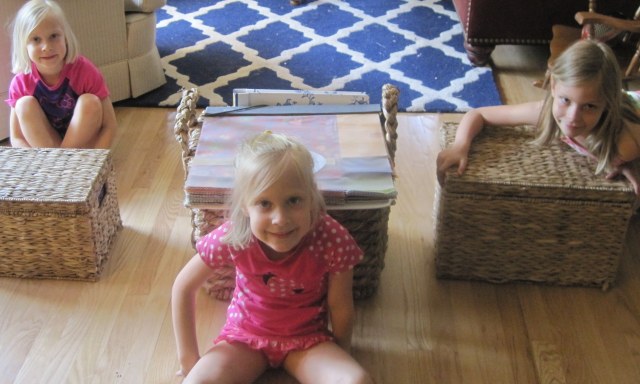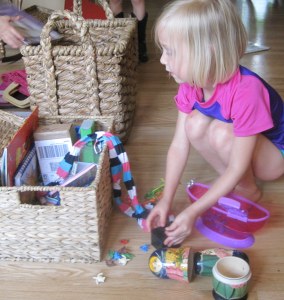From the American view of things, my family should be very concerned with fairness. Not only do I have three daughters who are close in age, but two of them are identical twins. Many would assume that I should strive greatly to pursue perfectly fair treatment for my kids at all times.
I don’t. In fact, when one of my kids whines, “It’s not fair,” my standard response is “I’m not interested in fairness.” Why?
There are two main reasons that we don’t do “fairness” at our house. First, “fairness” is understood by American children to mean exact sameness. So, for something to be fair, it must be exactly the same as the other person’s. The piece of cake must be precisely the same size as their sister’s, the shoes must be just as new with just as many sparkles, the amount of time practicing multiplication tables for the oldest must match the amount of time learning to read for the younger, and on and on. “Fairness” is a relentless master. One I refuse to be subject to. There is no better way to exhaust yourself and to increase the amount of petty arguing in your home than to make fairness a family goal.
Second, I desire to cultivate in my kids hearts of gratitude. I want to train their hearts to notice the continual flow of blessings into their lives and to be delighted in them. Fairness says “Hey, my piece is 1 cubic centimeter smaller than hers!” Gratitude says “Oh, wow, I get a piece of chocolate cake!” A mind that is concentrated on fairness is likely a self-focused, stingy mind, one that is intent only on grabbing as much as one can, everyone else be damned. I cannot think of a more miserable way to live. Or a less fruitful one.
None of this is to say that I am not interested in justice. No, questions of both global and local justice are close to my heart. I want my kids to know right from wrong, to understand equality in the sense of every person being treated with dignity and respect, to understand that consequences must follow crimes. I would argue, though, that they cannot become true champions of justice until their hearts are steeped in thankfulness. To champion justice is to seek the best for others; this is diametrically opposed to insisting on self-serving equity in miniscule personal matters like cupcake size.
It is not that I want my kids to squelch their hurt feelings when their sister gets something new or bigger. Rather, I want them to learn to say to themselves, “I feel sad that I got less candy than she did. But I’m sure there is plenty of candy to go around, and sometimes I’m the one who gets more. I guess I can be glad that I got candy at all. Wow, this raspberry jolly rancher tastes great!” Rest assured, my kids are just like yours. This self coaching is not yet their instinctive response, but we keep working on it. Why get caught up in centimeters when there is all this luscious, rich frosting to enjoy?
At the start of summer vacation a few years ago, I created a “box of delights” for each of my kids. I filled each box with gifts, games, and supplies that were closely tuned to that particular child’s interests and gifts. So, one of my daughters who loves families, small people and collections got a tribe of of small, coordinating lizards and a Russian nesting doll. Her twin loves beauty, color, and “decorating;” she got books of fabric and wallpaper samples full of rich colors and pretty patterns. Their older sister loves art, so she got paints, a selection of brushes and several empty canvases. There were a few items that I put in every box, but for the most part, the contents of the boxes differed greatly because the children differ greatly (yes, even the twins).
In our home, we promise goodness to our kids, not equality. Despite what they themselves think, they do not need the exact same things every moment. One may need a big scoop of ice cream after some hard work, while another needs new shoes because the old ones have worn out while the third needs an extra cup of juice because she’s fighting a cold. Harder still, one may need a soft word of encouragement while her twin needs a verbal challenge to try again and work harder this time. I believe it is a parent’s prerogative to dispense gifts and words, as needed, situation by situation, out of their abundant love and desire for the child’s good.
That’s just it, isn’t it? The child focused on fairness imagines the parent to be a cold, mercurial hoarder whereas the parent is actually a deeply benevolent figure, desiring to generously lavish good things on him/her. Or at least ought to be. My children need to learn to trust that I want the best for them and will generously provide it when I’m able, and that my larger perspective enables me to better discern what is actually best in most circumstances.
I believe this to be true of God, too. The Bible says He reserves the right to give and to take away. Rather than out of a capricious stinginess, His giving and taking away is due to the abundance of his wisdom and his love. He knows how to create the most delight-filled box for each of us and is intent on doing it.
So, things will continue to be unfair at the Goetsch home. But I pray that they are abundant in goodness, generosity, and delights of all kinds.
————————————
Please note: I have written an addendum to this post.
© Laura Goetsch and goetschblog, 2015.



Nailed it again. Well done.
LikeLiked by 1 person
L,
This is an excellent post. You must have had very wise parents, yourself : ))))
LikeLike
It’s true, I don’t remember you giving in to too much fairness whining. Or approaching life from that mind-set.
LikeLike
Pingback: Addendum to my post “Why I Don’t Treat My Kids ‘Fairly’” | Thinking about such things
Pingback: Things I tell my kids | Thinking about such things
Pingback: Proverbial Mom Wisdom Works - Christian Parenting